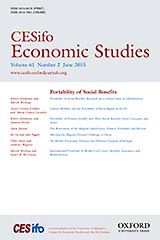Portability of Social Benefits
Volume 61 Issue 2 June 2015
Portability of Social Benefits: Research on a Critical Topic in Globalization
Robert Holzmann and
Martin Werding
Labour Mobility and the Portability of Social Rights in the EU
Anna Cristina d'Addio and
Maria Chiara Cavalleri
Using data from the Standard Eurobarometer survey 75.1 of 2011, the paper tests whether portability of social security within Europe is a key determinant of intra-European Union (EU) mobility. It does so by estimating a multinomial logit model with propensity matching comparing those survey respondents that made the experience of social security transfer in the past (either difficult or easy) to those that never had such experience. Estimations were run separately for two clusters of country: the older EU-15 and the newer EU-12. The results suggest that an easy experience with the transfer of social security across countries may increase the propensity to move abroad for professional reasons. In contrast, difficulties are likely to negatively affect mobility incentives. The sign of the effect is stable across countries, but intensity varies depending on the group of countries considered belonging to the EU-15 or EU-12. (JEL codes: J61, J62, H55, C25)
Portability of Pension, Health, and Other Social Benefits: Facts, Concepts, and Issues
Robert Holzmann and
Johannes Koettl
Portability of social benefits across professions and countries is an increasing concern for individuals and policy makers. Lacking or incomplete transfers of acquired social rights are feared to negatively impact individual labor market decisions as well as capacity to address social risks with consequences for economic and social outcomes. The paper gives a fresh and provocative look on the international perspective of the topic that has so far been dominated by social policy lawyers working within the framework of bilateral agreements; the input by economists has been very limited. It offers an analytical framework for portability analysis that suggests separating the risk pooling, (implicit or actual) pre-funding, and redistributive elements in the benefit design, and explores the proposed alternative approach for pensions and health care benefits. This promising approach may serve both as a substitute and complement to bi- and multilateral agreements. (JEL code: D690).
The Retirement of the Migrant Labor Force: Pension Portability and Beyond
Alain Jousten
The specificities of the workforce with a migrant background are often neglected in studies of retirement. Similarly, many studies of migration’s impact on pensions often focus on aggregate outcomes—system sustainability or distributive characteristics. The present article provides a fresh look at the nexus between these two literatures. It discusses the impact of the European social security coordination mechanisms on individual decision making and on the functioning of social security systems—with a focus on retirement. The article argues that such effects are nonnegligible and are likely to have major policy consequences. (JEL Codes: F22, H75, J26, J61)
Meeting the Migrant Pension Challenge in China
Bei Lu and
John Piggott
This article proposes a notional defined contribution (NDC) mechanism to ensure pension mobility for the 150 million migrating workers in China during both the accumulation and drawdown phases. Planned governance would ensure independence from the three existing pension systems. An appropriately structured NDC plan of this type is shown to be viable by reference to a previously developed model of Zhejiang Province’s social security systems. Such a plan would remove mobility barriers for migrating workers, increase the retirement benefit for mobile workers, and reduce the future government liability for payouts in other pension systems in which migrants currently hold membership. (JEL codes: H55, J11, J18, R23)
Do Mobile Pensioners Threaten the Deferred Taxation of Savings?
Volker Meier and
Andreas Wagener
We investigate optimal taxation of lifetime income with and without an option to emigrate during old age. The government sets the rates of deferred taxation and of taxes on interest income. With immobile agents, the optimal policy consists of full deferral of income taxes on savings and full taxation of interest. Potential mobility of the old calls for lower degrees of deferral and reduced taxation of interest. However, full immediate taxation of savings in combination with full tax exemption on interest income can never be optimal. (JEL codes: H21, H24, H26).
International Portability of Health-Cost Cover: Mobility, Insurance, and Redistribution
Martin Werding and
Stuart R. McLennan
Public health insurance and other arrangements covering health costs effectively provide insurance against changes in health status. These arrangements engage in burden-smoothing over the life cycle and entail various elements of redistribution. Lack of portability regarding this type of cover may impede international mobility and create financial losses or windfall gains on various sides, which can lead to risk segmentation across national health systems. Existing portability rules do not fully address these problems. In this article, we try to clarify the implications of mobility for typical systems covering health costs and the requirements which have to be met to ensure full portability. When individuals are internationally mobile, compensating payments are needed based on changes in expected net costs in both of the health funds involved. Illustrative simulations show that this approach may be operative under real-world conditions. (JEL codes: F22, F55, H51, H73, J6).

